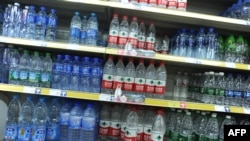A Chinese bottled water company is accusing a Beijing newspaper of fabricating stories to smear its product, in the second defamation case recently brought by large businesses against Chinese media.
The Nongfu Spring company said Tuesday it filed a complaint with China's top media regulator alleging the Beijing Times waged an "organized and premeditated" campaign against it. The company says the Times wrote as many as 76 negative stories about the quality of its water over a four week period earlier this year.
In the articles, the paper claimed that Nongfu Spring's water was worse than tap water. It said the company had adhered only to the safety standards of Zhejiang province, where it is located, rather than the stricter national standards, though its water is sold nation-wide. The company says these charges are false.
The official China Daily reported Tuesday that Nongfu Spring also has filed a defamation suit in a Beijing court seeking $9.7 million in damages from the Beijing Times. The paper has not commented on the charges.
Food safety is a sensitive issue in China, and newspapers are often filled with stories of egregious food safety violations that have in some cases been deadly.
The relationship between large businesses and media in China has also been under increased scrutiny. Last month, a reporter at the New Express newspaper apologized for taking bribes in exchange for writing negatively about a state-owned construction company.
The reporter, Chen Yongzhou, confessed on state television to fabricating stories in the Guangzhou-based newspaper claiming that Zoomlion artificially inflated its profits. Chen was arrested on defamation charges. Some top editors at the New Express also were replaced.
Chinese state-controlled media have since praised what they have described as a nationwide campaign against to crack down on journalistic corruption and rumor-mongering.
The Nongfu Spring company said Tuesday it filed a complaint with China's top media regulator alleging the Beijing Times waged an "organized and premeditated" campaign against it. The company says the Times wrote as many as 76 negative stories about the quality of its water over a four week period earlier this year.
In the articles, the paper claimed that Nongfu Spring's water was worse than tap water. It said the company had adhered only to the safety standards of Zhejiang province, where it is located, rather than the stricter national standards, though its water is sold nation-wide. The company says these charges are false.
The official China Daily reported Tuesday that Nongfu Spring also has filed a defamation suit in a Beijing court seeking $9.7 million in damages from the Beijing Times. The paper has not commented on the charges.
Food safety is a sensitive issue in China, and newspapers are often filled with stories of egregious food safety violations that have in some cases been deadly.
The relationship between large businesses and media in China has also been under increased scrutiny. Last month, a reporter at the New Express newspaper apologized for taking bribes in exchange for writing negatively about a state-owned construction company.
The reporter, Chen Yongzhou, confessed on state television to fabricating stories in the Guangzhou-based newspaper claiming that Zoomlion artificially inflated its profits. Chen was arrested on defamation charges. Some top editors at the New Express also were replaced.
Chinese state-controlled media have since praised what they have described as a nationwide campaign against to crack down on journalistic corruption and rumor-mongering.




